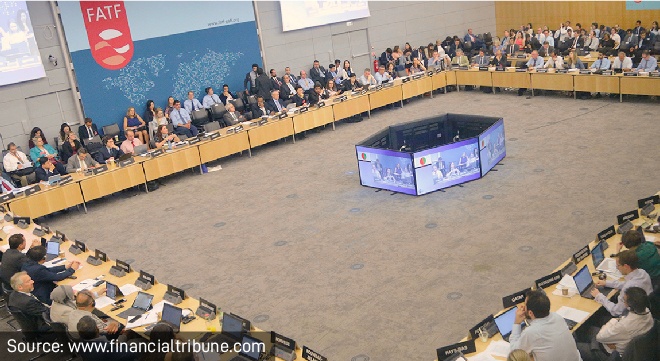South Africa will not get off the grey list in June this year after failing to demonstrate sufficient compliance with all the items on the Financial Action Task Force’s “to do” list by the stipulated deadline of January.
In October last year, National Treasury said the country would be in a position to be removed from the grey list in June if it addressed all 22 action items in the Action Plan by the time the FATF held its plenary in February.
At that stage, South Africa had whittled down to six the number of outstanding items in the Action Plan, which was drawn up when the FATF grey-listed South Africa in February 2023.
Read: SA racing against February deadline if it wants to exit grey list by mid-2025
The 22 action items are linked to the eight strategic deficiencies identified in South Africa’s anti-money laundering and counter-terrorism financing (AML/CFT) regime. The Action Plan also contains deadlines, linked to reporting cycles, by which South Africa must have addressed each of the 22 items.
On Friday, the FATF announced the upgrade of four of the six outstanding action items, following the conclusion of its plenary, which took place from 19 to 21 February in Paris.
South Africa is now deemed to have addressed or largely addressed 20 of the 22 action items.
But it has yet to demonstrate “sustained effectiveness” in investigating and prosecuting serious money laundering and terrorist financing activities.
The FATF’s statement, issued on 21 February, is as follows:
“Since February 2023, when South Africa made a high-level political commitment to work with the FATF and ESAAMLG [Eastern and Southern Africa Anti-Money Laundering Group] to strengthen the effectiveness of its AML/CFT regime, South Africa has taken steps towards improving its AML/CFT regime including by demonstrating that all supervisors apply effective, proportionate, and effective sanctions, ensuring competent authorities have timely access to accurate and up-to-date BO [beneficial ownership] information on legal persons and arrangements and applying sanctions for breaches of violation by legal persons to beneficial ownership obligations.
“South Africa should continue to work on implementing its Action Plan to address its remaining strategic deficiency on demonstrating a sustained increase in investigations and prosecutions of serious and complex money laundering and the full range of TF [terrorist-financing] activities in line with its risk profile.”
The two outstanding action items are stated on the Action Plan as follows:
- “South Africa should demonstrate a sustained increase in investigations and prosecutions of serious and complex money laundering, in particular involving professional money laundering networks/enablers and third-party ML in line with its risk profile.”
- “South Africa should demonstrate a sustained increase in the effective identification, investigation and prosecution of the full range of TF activities, consistent with its TF risk profile.”
January 2025 was the deadline for the country to demonstrate sustained and effective compliance with both action items.
The FATF currently assesses them as being “partly addressed”.
If South Africa manages to address or largely address both action items to the FATF’s satisfaction by June, it will be a position to be considered for removal from the grey list in October.
‘Most demanding goals’
On Friday, National Treasury said the FATF’s decision to extend the reporting cycle for these two action items reflects that they are “the most demanding goals” of every country’s AML/CFT regime, particularly because a country is required to demonstrate that the improvements made are sustained over successive reporting periods.
“Our investigation and prosecution teams are working closely in terms of a prosecution-guided investigation strategy to ensure that we demonstrate the sustained progress as required by FATF. These improvements are critical not just for getting off the grey list but, critically, for strengthening the fight against crime and corruption,” the statement said.
Treasury welcomed the efforts of financial and non-financial regulators, beneficial ownership registries, and law enforcement in securing the upgrades to the four action items for which they were directly responsible in the current reporting cycle.
It also noted the efforts by all law enforcement agencies to demonstrate the significant progress in respect of the two action items that have not been upgraded.
Treasury said South Africa continues to address both outstanding action items by June to enable an exit from grey-listing by October.
SA must also pass an on-site assessment
Demonstrating sufficient compliance with all the action items by January would not of itself have led to South Africa’s removal from the grey list in June.
If South Africa had addressed all the remaining action items, the FATF plenary in February would have authorised an on-site visit by the Africa Joint Group to confirm its assessment of the progress. This would have happened around May.
If the on-site assessment had resulted in a positive outcome, the Africa Joint Group would have recommended to the June plenary that South Africa be taken off the grey list.
But if the Joint Group assessed that South Africa had not adequately addressed all the action items, South Africa would have been required to continue reporting to the Group every four months until all the action items had been addressed. This would have moved the exit from greylisting from June to October, or later.
The grey list, officially the “list of jurisdictions under increased monitoring”, is a list of countries that are deemed to have deficiencies in their AML/CFT systems and are considered to pose a risk to the international financial system.
When a country is placed on the grey list, it means the FATF has identified certain weaknesses or shortcomings in its framework. These deficiencies could include inadequate laws or regulations, insufficient enforcement measures, or a lack of co-operation with other countries on AML/CFT issues.



